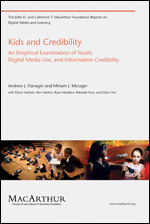 If you find yourself thinking about the digital research activities of children, especially older students who complete significant amounts of their research using the unlimited resources available on the World Wide Web, you are not alone. Over the past 10 years I have wondered — more than once and sometimes with great angst — if my child and the many children I’ve known really understand the need to evaluate the resources that they find on the web.
If you find yourself thinking about the digital research activities of children, especially older students who complete significant amounts of their research using the unlimited resources available on the World Wide Web, you are not alone. Over the past 10 years I have wondered — more than once and sometimes with great angst — if my child and the many children I’ve known really understand the need to evaluate the resources that they find on the web.
Earlier this year I discovered a small book, published by the MacArthur Foundation, describing research that explored how children perceive the quality and reliability of digital media. It’s a book that concerned parents may want to read. In Kids and Credibility: An Empirical Examination of Youth, Digital Media Use, and Information Credibility, authors Andrew J. Flanagin and Miriam J. Metzger, summarize their study as a “…comprehensive investigation into youth’s Internet use and their assessment of the credibility of online information.” The authors wondered whether young digital media users, while sophisticated and fearless about using technology, could evaluate information and determine its quality.
To learn more about young people and web credibility the researchers planned and executed a web-based survey of more than 2,000 children age 11 – 18. Study participants also completed a range of Internet tasks, evaluating information, making judgements about content, and explaining how and why they complete web tasks in certain ways. While there is far too much to cover in one blog post — check out the many interesting graphs in the publication — I’ve listed a few of the most interesting observations below. Continue reading “Kids and Web Resource Credibility”

You must be logged in to post a comment.